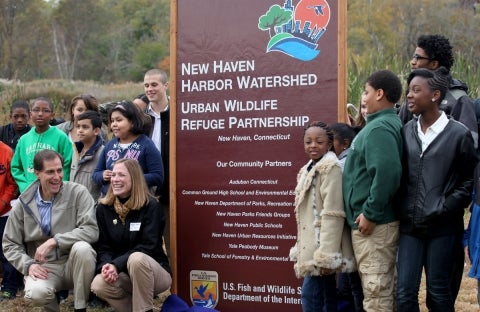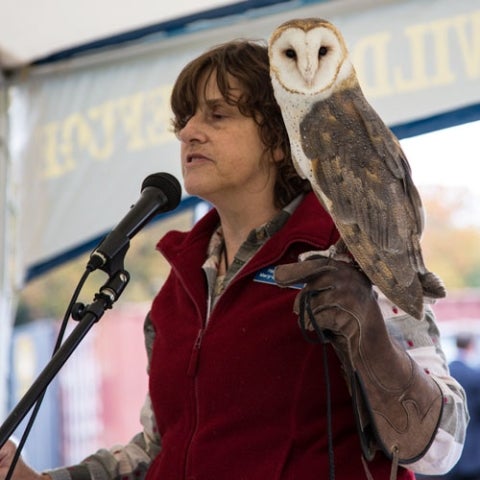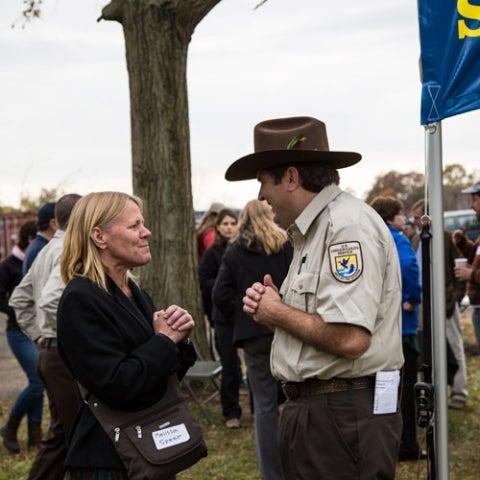Note: Yale School of the Environment (YSE) was formerly known as the Yale School of Forestry & Environmental Studies (F&ES). News articles and events posted prior to July 1, 2020 refer to the School's name at that time.
 U.S. Fish & Wildlife Service Director Dan Ashe and Northeast Regional Director Wendi Weber unveil the designation sign with students from Common Ground High School and Barnard Environmental Studies Magnet School.
U.S. Fish & Wildlife Service Director Dan Ashe and Northeast Regional Director Wendi Weber unveil the designation sign with students from Common Ground High School and Barnard Environmental Studies Magnet School.
Tucked behind the southwest corner of Derby Avenue and Ella T. Grasso Boulevard, a busy New Haven intersection where the rumble of cars and semi-trailers is nearly constant, the ecological and social importance of the West River Memorial Park can be deceptive.
But the value of this piece of land is multifold. In addition to helping to improve the water quality in nearby Long Island Sound, the park provides critical wildlife habitat — including a “rest stop” of sorts for migratory birds. And for children and adults living in the nearby neighborhoods, it provides an irreplaceable link to the natural world.
Last week, the U.S. Fish & Wildlife Service designated the park, as well as nearby Beaver Pond Park, as part of its network of Urban Wildlife Refuges, a classification that will mean critical funds for restoration work being done by a coalition of local groups — including F&ES’s Urban Resources Initiative.
The New Haven Harbor Watershed region represents one of only eight Urban Wildlife Refuges in the nation.
“It’s such an intersection of humans and nature,” said Colleen Murphy-Dunning, director of the Urban Resources Initiative (URI). “If you look one direction there’s this beautiful landscape. And if you look the other way there is lots of traffic.
“Ecologically it’s very important because of its connection to the Sound,” she said. “But it’s also terribly important because of its connection to where people live.”
Using more than $355,000 in funds, a coalition of partners — also including New Haven Parks, Recreation, and Trees; Audubon Connecticut; Common Ground High School; Barnard School, West River Neighborhood Services Association, Friends of Beaver Ponds Park and the Yale Peabody Museum — will help support environmental projects already underway at the New Haven watershed sites.
At the West River Memorial Park, where restoration work in recent years has helped native plants gradually reclaim an ecosystem formerly overrun by invasive phragmites, URI has supported neighborhood groups and local students plant native species for wildlife habitat. “We facilitate volunteer events, we purchase all the plant materials, and we dig alongside them,” said Murphy-Dunning.
Above all, the project will aim to teach New Haven students about the importance of land stewardship — and that the natural world can be found in their own neighborhood.
“The foundation of this project is to get these kids excited,” said Sharon Marino, deputy regional chief of the U.S. Fish & Wildlife Service. “They may not be aware of these natural places right here in their backyard. But if you get the kids out here, it doesn’t take much to get them hooked on the environment and why it’s important to protect it.”
But the value of this piece of land is multifold. In addition to helping to improve the water quality in nearby Long Island Sound, the park provides critical wildlife habitat — including a “rest stop” of sorts for migratory birds. And for children and adults living in the nearby neighborhoods, it provides an irreplaceable link to the natural world.
Last week, the U.S. Fish & Wildlife Service designated the park, as well as nearby Beaver Pond Park, as part of its network of Urban Wildlife Refuges, a classification that will mean critical funds for restoration work being done by a coalition of local groups — including F&ES’s Urban Resources Initiative.
The New Haven Harbor Watershed region represents one of only eight Urban Wildlife Refuges in the nation.
“It’s such an intersection of humans and nature,” said Colleen Murphy-Dunning, director of the Urban Resources Initiative (URI). “If you look one direction there’s this beautiful landscape. And if you look the other way there is lots of traffic.
“Ecologically it’s very important because of its connection to the Sound,” she said. “But it’s also terribly important because of its connection to where people live.”
Using more than $355,000 in funds, a coalition of partners — also including New Haven Parks, Recreation, and Trees; Audubon Connecticut; Common Ground High School; Barnard School, West River Neighborhood Services Association, Friends of Beaver Ponds Park and the Yale Peabody Museum — will help support environmental projects already underway at the New Haven watershed sites.
At the West River Memorial Park, where restoration work in recent years has helped native plants gradually reclaim an ecosystem formerly overrun by invasive phragmites, URI has supported neighborhood groups and local students plant native species for wildlife habitat. “We facilitate volunteer events, we purchase all the plant materials, and we dig alongside them,” said Murphy-Dunning.
Above all, the project will aim to teach New Haven students about the importance of land stewardship — and that the natural world can be found in their own neighborhood.
“The foundation of this project is to get these kids excited,” said Sharon Marino, deputy regional chief of the U.S. Fish & Wildlife Service. “They may not be aware of these natural places right here in their backyard. But if you get the kids out here, it doesn’t take much to get them hooked on the environment and why it’s important to protect it.”
– Kevin Dennehy kevin.dennehy@yale.edu 203 436-4842


Published
November 4, 2013